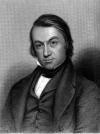"A man's a man," says Robert Burns,
"For a' that and a' that";
But though the song be clear and strong
It lacks a note for a' that.
The lout who'd shirk his daily work,
Yet claim his wage and a' that,
Or beg when he might earn his bread,
Is _not_ a man for a' that.
If all who "dine on homely fare"
Were true and brave and a' that,
And none whose garb is "hodden gray"
Was fool or knave and a' that,
The vice and crime that shame our time
Would disappear and a' that,
And plowmen be as great as kings,
And churls as earls for a' that.
But 'tis not so; yon brawny fool,
Who swaggers, swears, and a' that,
And thinks because his strong right arm
Might fell an ox, and a' that,
That he's as noble, man for man,
As duke or lord, and a' that,
Is but an animal at best
But _not_ a man for a' that.
A man may own a large estate,
Have palace, park, and a' that,
And not for birth, but honest worth,
Be thrice a man for a' that.
And Sawnie, herding on the moor,
Who beats his wife and a' that,
Is nothing but a brutal boor,
Nor half a man for a' that.
It comes to this, dear Robert Burns,
The truth is old, and a' that,
The rank _is_ but the guinea's stamp,
The man's the gowd for a' that.
And though you'd put the self-same mark
On copper, brass, and a' that,
The lie is gross, the cheat is plain,
And will not pass for a' that.
"For a' that and a' that"
'Tis soul and heart and a' that
That makes a king a gentleman,
And not his crown for a' that.
And whether he be rich or poor
The best is he, for a' that,
Who stands erect in self-respect,
And acts the man for a' that.






